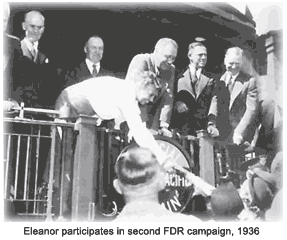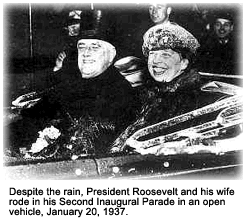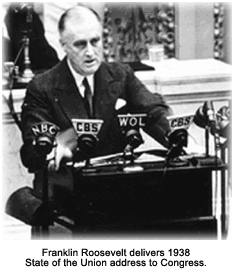In the election of 1936, FDR buried his Republican opponent Alf Landon by a landslide — 523 to eight in the electoral college — the widest margin of victory in more than 100 years. The election reflected the advent of a new Democratic political composition: It had become the party of the deprived, immigrants and city dwellers, and the new party of black Americans.
 FDR`s inauguration speech in January 1937 was forcefully pitched to the common man, who was largely responsible for his victory. To the president it appeared that he had carte blanche for his continuing domestic agenda — with only the Supreme Court in his way. Mere weeks into his second term, Roosevelt uncorked a withering attack on that institution.
FDR`s inauguration speech in January 1937 was forcefully pitched to the common man, who was largely responsible for his victory. To the president it appeared that he had carte blanche for his continuing domestic agenda — with only the Supreme Court in his way. Mere weeks into his second term, Roosevelt uncorked a withering attack on that institution.
Domestic Affairs
The Supreme Court. The U.S. Constitution (narrative) states that only Congress can make laws that are binding upon all Americans. The Constitution (text) also states that Congress may regulate such activities as interstate communications. However, Congress`s sheer size and numerous responsibilities prevent it from regulating efficiently. The courts therefore have held that Congress can delegate its regulatory power to such government agencies as the Federal Communications Commission. The distinction between a regulation and a law can become blurred. The regulations of some New Deal agencies became controversial. In 1935, for example, the government was sued by a chicken vendor to abrogate the National Industrial Recovery Act.
The case advanced all the way to the Supreme Court, which ruled the act unconstitutional because it had delegated lawmaking powers to the National Recovery Administration (NRA). The ruling terminated the NRA — a key New Deal agency.
Several other New Deal acts also were declared unconstitutional. The president faced the bleak prospect that his entire agenda might come apart in court.
 In February 1937, Roosevelt submitted a judicial reorganization bill to Congress. He presented it as a simple reform, but he was actually spurred by the opposition his New Deal measures faced in the federal courts, especially the Supreme Court. The president proposed that when a federal judge turned 70, a younger judge should be appointed to join him, bringing a potential total of 50 new judgeships with six of them on the Supreme Court.
In February 1937, Roosevelt submitted a judicial reorganization bill to Congress. He presented it as a simple reform, but he was actually spurred by the opposition his New Deal measures faced in the federal courts, especially the Supreme Court. The president proposed that when a federal judge turned 70, a younger judge should be appointed to join him, bringing a potential total of 50 new judgeships with six of them on the Supreme Court.
Roosevelt`s opponents accused him of attempting to "pack" the Supreme Court with judges sympathetic to the New Deal. In March, Roosevelt personally campaigned for his proposal, averring biases of the court majority were blocking national progress.
Chances for passage of the bill dwindled when a conservative Supreme Court justice retired and a backer, Senator Joseph Robinson, died. In addition, some New Deal legislation was upheld by the court, including the Social Security Act and the National Labor Relations Act. The Judicial Procedure Reform Act, which included some of the president`s recommendations — minus additional judges — was passed in its place. As it turned out, Roosevelt managed to appoint seven justices to the Supreme Court over the next four years.
As the Thirties wore on, alarm bells began to ring from abroad. The president`s attention was increasingly drawn to foreign aggression in the form of intimidation in Europe and outright hostilities in Asia. Some historians argue that World War II was started by Japan in 1937.
Foreign Affairs
The question of aggression. By the mid-1930s, President Roosevelt became convinced that Japan`s aggression in China posed a threat to world peace. On July 7, 1937, Japanese soldiers tangled with Chinese units in the demilitarized zone that had been established between Peking and the Great Wall. A full-blown invasion followed, during which Japan overcame China`s main ports and large swaths of the country`s interior. The violence was especially savage in the "Rape of Nanking," where an estimated 300,000 civilians were killed.
Roosevelt attempted to alert the country to the menace. In a October 1937 foreign-policy speech, he urged peaceful countries to unite and "quarantine" international lawlessness in the manner that physicians isolate a contagious disease. "Let no one imagine that America will escape, that America may expect mercy, that this Western Hemisphere will not be attacked," he said.
The Roosevelt administration refused to diplomatically recognize Manchukuo, the puppet state that Japan had set up in northern China. Roosevelt held that Japan should heed American rights in the Pacific and Far East. The president demanded an apology and compensation from Japan for the sinking of the American gunboat Panay in 1937. The Japanese complied without delay.
Roosevelt and Secretary of State Cordell Hull argued for a policy that would allow the United States to arm for defense. The president attempted to upgrade the army and navy, but Congress frequently defied his efforts.
The desire of numerous Americans to isolate the United States from other nations found tangible results in the neutrality laws of the 1930s. They also resulted in part from much questioning of the motives for, and the outcome of, America`s involvement in World War I. Following Italy`s attack on Ethiopia in May 1935, Congress passed the first Neutrality Act in August, which prohibited the United States from providing military matériel to any nation at war. President Roosevelt voiced his hope that future neutrality laws "might provide for greater flexibility." But in the following two years, Congress approved other legislation to keep America out of overseas commitments.
Roosevelt took issue with the neutrality laws because they did not discriminate between an aggressor country and a victimized country. Moreover, the laws rendered it nearly impossible for the U.S. to come to the aid of any friendly nation. Believing that a victory of the Axis powers — Germany, Italy and Japan — would put democracy at risk around the world, Roosevelt`s desire was to furnish "all aid short of war" to nations opposing them.
 Most historians mark September 1, 1939, as the beginning of World War II, when Germany invaded Poland. Numerous "isolationist" Americans still did not agree that the situation was as perilous as the president insisted. Some isolationists pilloried Roosevelt for attempting to drag America into the conflagration.
Most historians mark September 1, 1939, as the beginning of World War II, when Germany invaded Poland. Numerous "isolationist" Americans still did not agree that the situation was as perilous as the president insisted. Some isolationists pilloried Roosevelt for attempting to drag America into the conflagration.
Other Americans became more alarmed about the war in Europe as tensions heightened. Shortly after German forces attacked Poland, Congress passed the Neutrality Act of 1939, which allowed for a nation fighting the Axis powers to purchase war supplies from the United States. However, it had to provide its own ships to carry the cargo.
After recurring confrontations with German U-boats in the North Atlantic and the torpedoing of the destroyer Reuben James, Congress repealed two sections of the 1939 act in November 1941. Those sections had kept American vessels out of war zones and had prohibited them from carrying guns. America`s entry into the war lay just three weeks ahead.
Election of 1940
By nominating Roosevelt for a third consecutive term in 1940, the Democratic Party broke with past custom. Henry A. Wallace, secretary of agriculture, came aboard as the vice-presidential running mate. Roosevelt and Vice President John Nance Garner had often been at odds. The Republicans nominated corporation president Wendell L. Wilkie of Indiana, to challenge Roosevelt. Charles N. McNary of Oregon became their vice-presidential candidate. Willkie opposed the strictures that the Roosevelt administration had placed on business, but generally supported the president`s foreign policy.
Also in 1940, Roosevelt appointed two Republicans to his cabinet, to help ensure the backing of his military program by members of both parties. Henry L. Stimson became Secretary of War. He had held the office under President William Howard Taft, and had been President Hoover`s secretary of state. Stimson replaced Harry H. Woodring, who was considered to be an isolationist. Frank Knox, a newspaper publisher, became Secretary of the Navy.
The war was the main campaign issue in 1940. The isolationists fielded no candidate that year. Because of his shared outlook with Roosevelt on foreign policy matters, Willkie was at a disadvantage. The president elected to defend his New Deal programs and emphasize his status as commander in chief in parlous times. France had capitulated to Germany in June. The defeat of the French army, believed by many to be the world`s most powerful, appalled the United States. Most voters concluded that Roosevelt`s experience and leadership were necessary for another four years. Roosevelt swept up 38 of the 48 states, and won 449 electoral votes to 82 for Willkie, who won a respectable 22,304,755 popular votes, based largely on his personal charisma.
With the war in Europe intensifying, FDR gave his "arsenal of democracy" speech on December 29, 1940. He said:
Let not the defeatists tell us that it is too late. It will never be earlier. Tomorrow will be later than today. Certain facts are self-evident. In a military sense Great Britain and the British Empire are today the spearhead of resistance to world conquest. And they are putting up a fight which will live forever in the story of human gallantry. There is no demand for sending an American expeditionary force outside our own borders. There is no intention by any member of your government to send such a force. You can therefore, nail, nail any talk about sending armies to Europe as deliberate untruth. Our national policy is not directed toward war. Its sole purpose is to keep war away from our country and away from our people.But it was not to be.